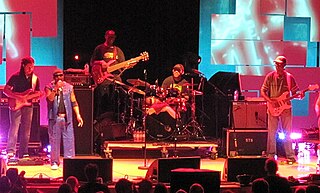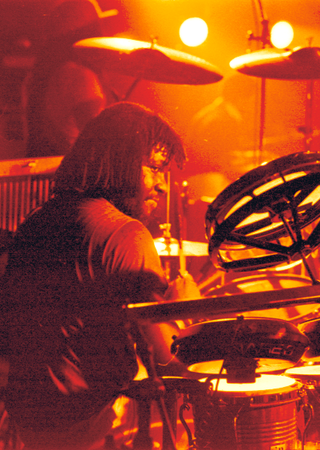Related Research Articles

Mark Anthony Myrie, known professionally as Buju Banton, is a Jamaican reggae dancehall musician. He is one of the most significant and well-regarded artists in Jamaican music. Banton has collaborated with many international artists, including those in the hip hop, Latin and punk rock genres, as well as the sons of Bob Marley.
In Jamaican dancehall music, a riddim is the instrumental accompaniment to a song and is synonymous with the rhythm section. Jamaican music genres that use the term consist of the riddim plus the voicing sung by the deejay. A given riddim, if popular, may be used in dozens—or even hundreds—of songs, not only in recordings but also in live performances.

Sean Paul Ryan Francis Henriques is a Jamaican rapper and singer. He released his first album, Stage One, in 2000. However, it was in 2002 that he gained international fame after releasing his next album, Dutty Rock. The single "Get Busy" topped the Billboard Hot 100 chart in the United States, as did "Temperature" (2005), off his third album, The Trinity. Paul frequently invokes the nickname "Sean da Paul", originating from the similarity between his stage name and cricketer Shivnarine Chanderpaul.

The Maytals, known from 1972 to 2020 as Toots and the Maytals, are a Jamaican musical group, one of the best known ska and rocksteady vocal groups. The Maytals were formed in the early 1960s and were key figures in popularizing reggae music.
"54-46 " is a song by Fred "Toots" Hibbert, recorded by Toots and the Maytals, originally released on the Beverley's label in Jamaica and the Pyramid label in the UK. A follow-up version released a year later, "54-46 Was My Number", was one of the first reggae songs to receive widespread popularity outside Jamaica, and is seen as being one of the defining songs of the genre. It has been anthologised repeatedly and the titles of several reggae anthologies include "54-46" in their title.
There are several subgenres of reggae music including various predecessors to the form.

Frederick Nathaniel "Toots" Hibbert, was a Jamaican singer and songwriter who was the lead vocalist for the reggae and ska band Toots and the Maytals. A reggae pioneer, he performed for six decades and helped establish some of the fundamentals of reggae music. Hibbert's 1968 song "Do the Reggay" is widely credited as the genesis of the genre name reggae. His band's album True Love won a Grammy Award in 2005.

Reggae Sumfest is the largest music festival in Jamaica and the Caribbean, taking place each year in mid-July in Montego Bay. Sumfest started in 1993.

Sly and Robbie were a prolific Jamaican rhythm section and production duo, associated primarily with the reggae and dub genres. Drummer Sly Dunbar and bassist Robbie Shakespeare teamed up in the mid-1970s after establishing themselves separately in Jamaica as professional musicians. Shakespeare died in December 2021 following kidney surgery.

Wayne Smith was a Jamaican reggae and dancehall musician best known for his 1985 hit "Under Me Sleng Teng", which is regarded as the track which initiated the digital era of reggae.
The Stalag riddim is a popular reggae riddim, which came to prominence in the 1980s. It was originally written and recorded as "Stalag 17" by Ansel Collins and released by Winston Riley's Techniques record label in 1973. The riddim has been used on hundreds of derivative records.

Marcia Llyneth Griffiths is a Jamaican singer. One reviewer described her by noting "she is known primarily for her strong, smooth-as-mousse love songs and captivating live performances".
Reggae fusion is a fusion genre of reggae that mixes reggae and/or dancehall with other genres, such as pop, rock, hip-hop/rap, R&B, jazz, funk, soul, disco, electronic, and Latin music, amongst others.

Janice Fyffe, known as Lady G, is a Jamaican dancehall and reggae deejay. She is widely recognised as a dancehall veteran and pioneer.
Ophlin Russell, better known as Sister Nancy, is a Jamaican dancehall DJ and singer. She is known to the world as the first female dancehall DJ and was described as being a "dominating female voice for over two decades" on the dancehall scene.

Andrae Hugh Sutherland, known professionally as Popcaan, is a Jamaican dancehall singer.

"Bum Bum" is a song by American singer Kat DeLuna featuring Trey Songz, released by eOne as a standalone single on March 30, 2015. A dance song, it samples and interpolates Sister Nancy's "Bam Bam" (1982) and Shaggy and Rikrok's "It Wasn't Me" (2000). The instrumental has reggae influences and the lyrics are about sex. The song was included on DeLuna's compilation album Loading (2016). Critics had a mixed response to "Bum Bum", which peaked at number 32 on the Rhythmic Billboard chart. The song was promoted with a music video released on June 16, 2015. In it, DeLuna dances and appears nude. Noise Cans and Frank Delour released remixes for the single.

Winston Foster, better known by the stage name Yellowman and also known as King Yellowman, is a Jamaican reggae and dancehall deejay. He first became popular in Jamaica in the 1980s, rising to prominence with a series of singles that established his reputation.

Paul Douglas is a Jamaican musician, best known for his work as the drummer, percussionist and bandleader of Toots and the Maytals. His career spans more than five decades as one of reggae's most recorded drummers. Music journalist and reggae historian David Katz wrote, "dependable drummer Paul Douglas played on countless reggae hits."

"Murder She Wrote" is a song by Jamaican reggae duo Chaka Demus & Pliers, from their 1993 album Tease Me. It was first released as a single in 1992 and again in late 1993, reaching number 27 on the UK Singles Chart in early 1994, and number 57 on the US Billboard Hot 100, spending 17 weeks there. The song was certified gold in the UK in 2022. The music to the song is based on the Maytals' 1966 song "Bam Bam", while the lyrics discuss abortion.
References
- 1 2 3 4 Sister Nancy & Producer Winston Riley's Son Talk 'Bam Bam' Sample on Kanye West's 'The Life of Pablo', Billboard, 2016-02-16
- ↑ "The 30-Year Journey of Sister Nancy, Jamaica's First Female Dancehall Star". Genius. Retrieved 15 July 2017.
- ↑ Warren, Emma (2007-08-12). "Bobby Kray, Tales From a Skinny White Boy". The Observer . Retrieved 2008-07-15.
- ↑ Small, Elle J (2007-08-31). "Bobby Kray - Tales From A Skinny White Boy". BBC . Retrieved 2008-07-15.
- ↑ HOT 97 (17 May 2017). "Sister Nancy Speaks On Her Beginnings & Opens Up On Reggae/Dancehall Today" . Retrieved 15 July 2017– via YouTube.
{{cite web}}: CS1 maint: numeric names: authors list (link) - ↑ "Bam Bam tops iTunes charts", Jamaica Observer , 17 January 2015. Retrieved 18 January 2015
- ↑ Steyels, Mike. “The History of Sister Nancy’s Bam Bam Goes Way Before Jay-Z’s Album.” June 30, 2017
- ↑ "What A Bam Bam!". The Jamaica Observer. 2020-08-10.
- ↑ R. Henry Gordon, N. N. McCarthy & Frederick Hibbert (1978) "ABC reggae & 260 other titles. (Part 001 of 002)", United States Copyright Office, Document Number V1700P105
- 1 2 3 Kochhar, Nazuk. "Ain't No Stopping Sister Nancy Now". The Fader. The Fader, Inc. Retrieved 3 December 2018.
- ↑ "British single certifications – Sister Nancy – Bam Bam". British Phonographic Industry . Retrieved 7 January 2022.
- ↑ "Bam Bam by Sister Nancy on WhoSampled". WhoSampled. Retrieved 15 July 2017.
- ↑ Lauryn Hill – Lost Ones , retrieved 2018-12-13
- ↑ "Kat Deluna - Bum Bum Feat. Trey Songz". Hot New Hip Hop. March 30, 2015. Retrieved May 26, 2015.
- ↑ Moore, Sam (2018-03-13). "Sister Nancy says it's a "blessing" to have been sampled by both Kanye West and Jay-Z". NME. Retrieved 2018-12-13.
- ↑ "10 Things You Might Have Missed From Beyoncé's Show-Stopping Coachella Set". HuffPost UK. 2018-04-16. Retrieved 2018-11-05.
- ↑ "These 5 Lizzo Songs Will Make Your 2019 with Their Badass, Body Positive Lyrics & Powerful Beats".
- ↑ Campbell, Howard (2014) "Nancy's Interview Pays Off", Jamaica Observer , 31 December 2014. Retrieved 1 January 2015
- ↑ "Sister Nancy Surges To No. 1 On Charts After 'Bam Bam' Is Featured In Netflix's 'Ozark'". DancehallMag. 2022-01-24. Retrieved 2022-01-24.